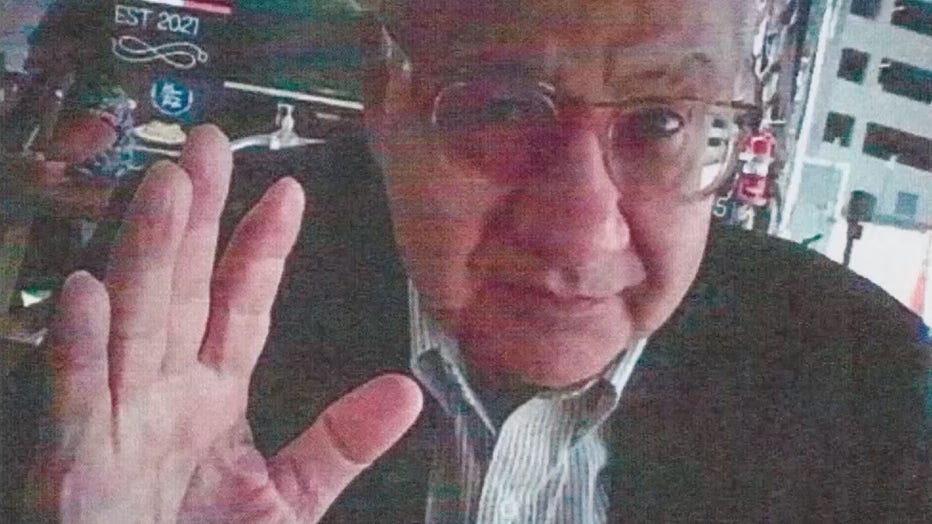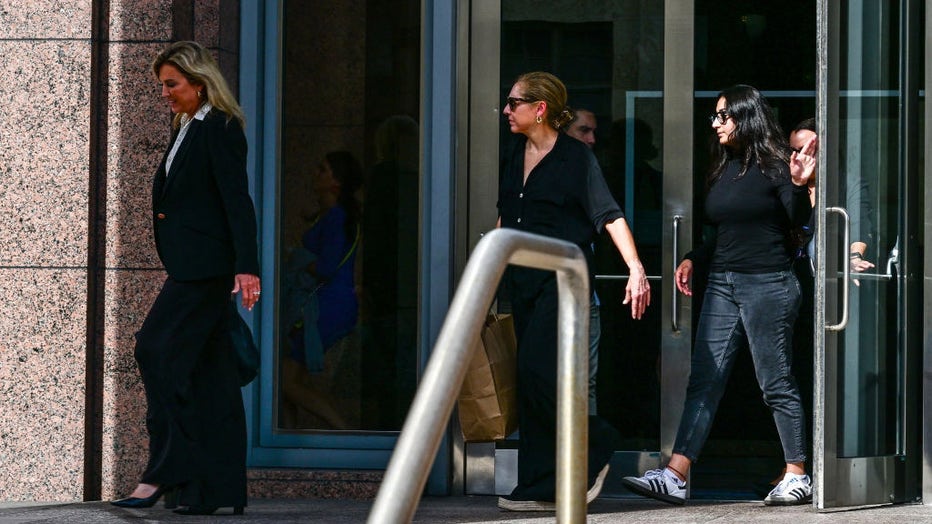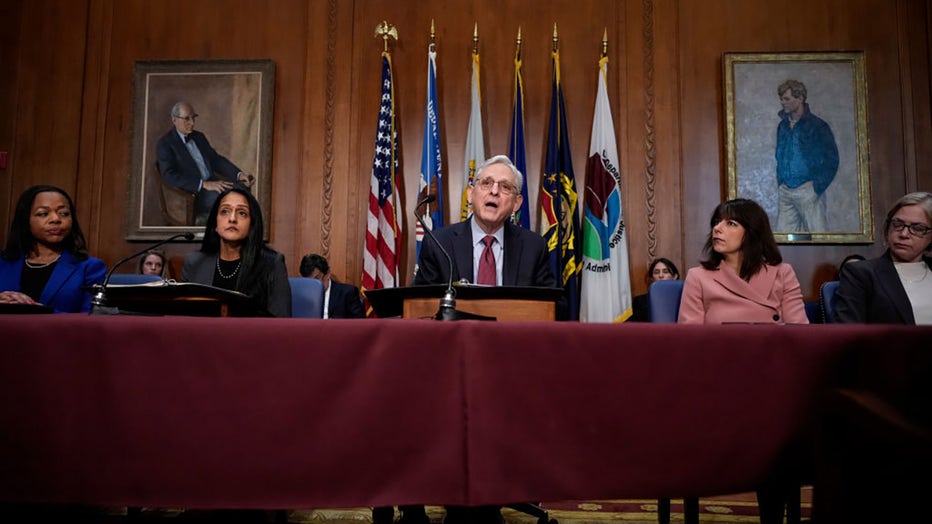Former US ambassador accused of secretly spying for Cuba for decades

Former U.S. diplomat charged with spying for Cuba
Manuel Rocha, a former American diplomat who served as a U.S. ambassador to Bolivia, has been arrested and accused of secretly serving as an agent of Cuba?s government.
MIAMI - A former career American diplomat was charged with serving as a secret agent for communist Cuba going back decades in what prosecutors portrayed as one of the most brazen and long-running betrayals in the history of the U.S. foreign service.
Manuel Rocha wept as he sat handcuffed in Miami federal court on charges that he engaged in "clandestine activity" on Cuba's behalf since at least 1981 — the year he joined the U.S. foreign service — including by meeting with Cuban intelligence operatives and providing false information to U.S. government officials about his contacts.
The complaint unsealed Monday is short on specifics of how Rocha may have assisted Cuba. But it provides a vivid case study of what American officials say are long-standing efforts by Cuba and its notoriously sophisticated intelligence services to target U.S. government officials who can be flipped.
"This action exposes one of the highest-reaching and longest-lasting infiltrations of the United States government by a foreign agent," Attorney General Merrick Garland said in a statement. "To betray that trust by falsely pledging loyalty to the United States while serving a foreign power is a crime that will be met with the full force of the Justice Department."

An image provided by the Justice Department and shown in the affidavit in support of a criminal complaint shows Manuel Rocha during a meeting with a FBI undercover employee. (Credit: U.S. Department of Justice)
The 73-year-old Rocha, whose two-decade career as a U.S. diplomat included top posts in Bolivia, Argentina and the U.S. Interests Section in Havana, was arrested by the FBI at his Miami home Friday. He was ordered held following Monday's brief court appearance pending a bond hearing Wednesday. His attorney declined to comment.
The Justice Department did not reveal how Rocha attracted the attention of Cuba’s intelligence operatives nor did it describe what, if any, sensitive information he may have provided while working for the State Department and in a lucrative post-government career that included a stint as a special adviser to the commander of U.S. Southern Command.
Instead, the case relies largely on what prosecutors say were Rocha's own admissions, made over the past year to an undercover FBI agent posing as a Cuban intelligence operative named "Miguel."
Rocha praised the late Cuban leader Fidel Castro as "Comandante," branded the U.S. the "enemy" and bragged about his service for more than 40 years as a Cuban mole in the heart of U.S. foreign policy circles, the complaint says.
"What we have done … it’s enormous … more than a Grand Slam," he was quoted as saying at one of several secretly recorded conversations.
To cover his tracks, Rocha referred to Cuba as "the island" and led a "normal life" disguised as a "right-wing person," he said in one of the recordings. Former colleagues and friends described Rocha as a vocal admirer of former President Donald Trump, who took a hard line on Cuba.
John Feeley, who ended a long diplomatic career serving as U.S. ambassador to Panama, said he was surprised how his mentor, who had served administrations of both parties, had so fully embraced Trump’s politics.
"It is beyond ironic that he cultivated this cartoonish persona," he said, "and that everyone apparently bought it."
Washington and Havana restored diplomatic relations in late 2014 after a half-century of Cold War acrimony, though the Trump administration reimposed sanctions on Cuba and, in 2021, redesignated it a state sponsor of terrorism. The Biden administration has moved more gingerly to restore some Obama-era concessions.
The charging document traces Rocha’s illegal ties to Cuba to well after his departure from the federal government, when he took on lucrative private sector jobs — most recently as a senior adviser to an international public relations firm and prominent U.S. law firm.
The FBI learned about the relationship last year and arranged a series of undercover encounters in discrete locations — a church and outdoor food court — in downtown Miami. Rocha deliberately strayed from the most-direct route to those encounters, pausing along the way in what prosecutors allege was classic, counter-surveillance "tradecraft" taught by Cuba’s spymasters.
"It’s what I’ve always been told to do," Rocha told the undercover agent at one of those meetings.

Karla Wittkop, wife of Victor Manuel Rocha (R) and lawyer Jacqueline Arango (L) leave the James L. King Federal Court in Miami, Florida, on December 4, 2023. (Photo by GIORGIO VIERA / AFP) (Photo by GIORGIO VIERA/AFP via Getty Images)
At another meeting, Rocha referred to Cuba shooting down two unarmed planes sent by the Miami-based group of exiles, Brothers to the Rescue, in which four opponents of Castro’s government were killed in 1996.
There’s no indication in the complaint that Rocha aided the Cubans with the military operation — a major flashpoint in more than a half-century of brinksmanship between the communist-ruled island and its right-wing opponents in Miami. But at the time he served as a senior political officer at the U.S. special interest section in Havana.
"I lived through it, because I was in charge," Rocha was quoted as saying. "That was a time of a lot of tension."
Last Friday, when interviewed by two Diplomatic Security Service agents, Rocha repeatedly lied, including by denying having ever met someone matching the undercover agent's description, according to the charging document.
Rocha’s service to Cuba may have gone back even earlier than the start of his U.S. diplomatic career.
The complaint cites Rocha telling the undercover agent that he first proved his loyalty in Chile in 1973 — the year Gen. Augusto Pinochet, with U.S. backing, overthrew the socialist government of Salvador Allende.
"They must have told you something because you mentioned Chile," Rocha told the undercover agent, who presented himself as having reached out to him at the request of higher-ups in Cuba’s National Intelligence Directorate. "That inspired trust in me."
Born in Colombia, Rocha was raised in a working-class home in New York City and obtained a succession of liberal arts degrees from Yale, Harvard and Georgetown before joining the foreign service.
He was the top U.S. diplomat in Argentina between 1997 and 2000 as a decade-long currency stabilization program backed by Washington was unraveling under the weight of huge foreign debt, triggering a political crisis that would see the South American country cycle through five presidents in two weeks.
At his next post, as ambassador to Bolivia, he intervened directly in the 2002 presidential race, warning weeks ahead of the vote that the U.S. would cut off assistance to the poor South American country if it were to elect former coca grower Evo Morales.
"I want to remind the Bolivian electorate that if they vote for those who want Bolivia to return to exporting cocaine, that will seriously jeopardize any future aid to Bolivia from the United States,″ Rocha said in a speech that was widely interpreted as an attempt to sustain U.S. dominance in the region.
The comments backfired, angered Bolivians and boosted support for Morales, who joked that Rocha was his "best campaign chief." When Morales was finally elected three years later, the leftist leader expelled Rocha’s successor as chief of the diplomatic mission for inciting "civil war."
Rocha also served in Italy, Honduras, Mexico and the Dominican Republic, and worked as a Latin America expert for the National Security Council.

U.S. Attorney General Merrick Garland (C) announces that Victor Manuel Rocha, the former U.S. ambassador to Bolivia, has been charged with acting illegally as a foreign agent for the government of Cuba, during a press conference at the U.S. Departmen
Criminal cases against American officials accused of doing Cuba’s bidding are rare but not unprecedented. A former State Department official, Walter Kendall Myers, was sentenced in 2010 to life in prison for providing classified information to Cuba, and Ana Belen Montes, a former U.S. defense intelligence analyst who was convicted of spying for Cuba, was released from prison in January after a lengthy sentence.
But of all the spy scandals in the last 40 years, Rocha is believed to be the first member of America’s elite foreign service to have been accused of betraying their oath, said Kevin Whitaker, a former U.S. ambassador to Colombia.
"If this is true, Rocha has stained the institution of the foreign service," he said. "It’s infuriating."
RELATED: China detains military group worker suspected of spying for CIA
___
Tucker reported from Washington.

